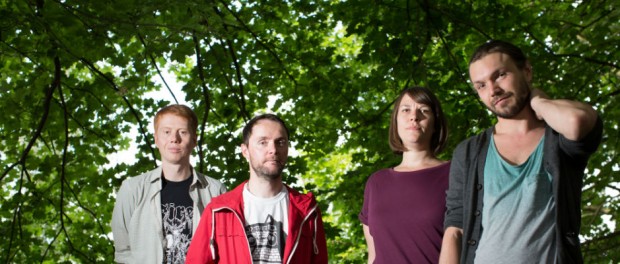Chapter & Verse: The Leaf Library

In the second edition of Chapter & Verse, we turn to The Leaf Library and their measured, pastoral vision of indie that soothes and provokes equally; the gentle surfaces of their album Daylight Versions hide a restlessness – pick up a rock and see the natural urgency that lies underneath. The follow-up to 2011’s Different Activities, Similar Diversions, it sees them push their collective, collaborative approach into ever more interesting – and sometimes dangerous – waters.
As if the name wasn’t enough of a give away, you can just tell they’re the kind of people who keep well-stocked bookcases, so we asked guitarist Matt Ashton from the band to pick out a few titles for us – the kind of thing for which Daylight Versions could offer the perfect soundtrack.
The three books that I’ve picked all deal with descriptions of places (and the journeys taken to get there), both real and imagined. Each one has a particular quirk that takes it out of the category of pure documentary, blurring the lines between fact and fiction, and revealing more of the author than the places they purport to record. Most importantly though, all of these books have made their way into our music in one way or another, either in borrowed phrases or the vain attempt to recreate an atmosphere first glanced in its pages.
Invisible Cities – Italo Calvino
Calvino’s beautiful book takes the form of imagined conversations between the explorer Marco Polo and the Emperor Kublai Khan about the far flung places that the adventurer has visited. The ‘invisible’ of the title is a substitute for ‘illusory’, with each place described by Polo an allegory for his home city of Venice.
As Polo says in the book, “Every time I describe a city I am saying something about Venice. Memory’s images, once they are fixed in words, are erased. Perhaps I am afraid of losing Venice all at once, if I speak of it…”
He describes each imagined place in detail – its citizens, goods, weather and layout, none of which could ever be used to navigate. The poetic and fantastical pieces are arranged in a mathematical pattern (the table demonstrating this is a beautiful thing in itself), with titles that lead the reader deep into their imagination; ‘Cities and Memory’, Cities and Desire’, Cities and the Dead’, Continuous Cities’ and so on.
Not unlike the modernist free writing of arch-confounder Getrude Stein, you’re left to gather your own meaning about each city, using your own mind to fill in the gaps. For a young(ish) design student becoming obsessed with the idea of the city and its effect on the imagination this book blew my mind, and still gently does each time I reread it.
Rings of Saturn – WG Sebald
The next book deals with actual journeys made by German author WG Sebald around his adopted home of Norfolk and Suffolk. Walking the fens and fields of east England he sets out on a (roughly) circular route from his home in Norwich, taking in Southwold, the ghost town of Dunwich and Rendlesham Forest. The narrative deviates from standard travelogue by virtue of the countless digressions made by the author, journeys along deep and twisting rabbit holes of fact and memory, sparked by details and places encountered on the surface.
Sebald’s is a melancholy voice, almost comically doleful, and one that can only be made more unique by being translated from the original German. A permanent cloud hangs over his words, a muggy, grey summer haze that’s only occasionally lifted by memory or anecdote, breezing in before rapidly disappearing, like wind coming in from the north sea. I love every last word of it.
I was drawn at first to his descriptions of the old military testing area of Orford Ness, a strange lunar-like shingle spit that bows out into the choppy sea. Eerie enough on its own, the post-human feel of the place is only enhanced by the abandoned testing facilities (incongruously resembling bombed out Buddhist temples) and a radar site called Black Beacon.
Sebald’s wonderful and poetic work draws you in and slowly (he doesn’t reveal anything at speed) turns the whole area into a melancholy, dreamlike hinterland, permanently cast in half light.
A Time of Gifts – Patrick Leigh Fermor
The final book is another based on real life events, this time rendered odd by the time lapsed between walking and writing. At 18 Patrick Leigh Fermor set out from the Hook of Holland to walk to (then) Constantinople, a journey that took him through central Europe at one of its most unique points in the twentieth century. The towns, characters and landscape all come to life; encounters, adventures and difficulties all recalled with wide eyed, yet intelligent enthusiasm.
He barely has any money, occasionally takes small jobs, sleeps rough and winds up ingratiating himself into Austrian high-society (for a time at least), giving him a network of friends and supporters all the way to Hungary.
Far too worldy wise for an 18 year old, it’s useful to remember that it wasn’t written until the 1960s when Leigh Fermor was well into his 40s (partly due to the diary he had been keeping being lost in Romania, returned to a no doubt grateful author years later). It’s Fermor’s life experience from the intervening years that make this book special, his time in Greece during the Second World War creating a unique prism through which we can view the pre-war continent (and the advancingunease and upheaval). The book stops in Hungary, the journey completed in ‘Between the Woods and the Water’.
Fermor has written many more non-fiction books about travels and his wartime pursuits (plus the amazing novella ‘The Violins of Saint-Jacques) but it’s the combination of his wit (and wits), and a time that is now exotically just now out of reach that makes this one particularly special.
All three authors have now left us, Leigh Fermor sliding gracefully into old age, Calvino struck down by a brain haemorrhage at 61 and Sebald going years too soon in a car crash in 2001. All three of their journeys are now complete, free for us to explore and bend to our own imaginations as we wish. Thanks guys.
Daylight Versions is out now via wiaiwya. For more information, visit The Leaf Library’s Bandcamp page.





